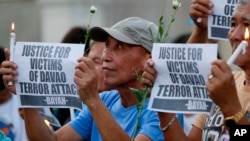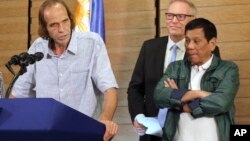Philippine President Rodrigo Duterte has offered to negotiate with two of his country’s most violent Muslim rebel groups after months of military strikes, making his strategy for ending a complex 45-year conflict unclear despite pledges to settle it.
In a recent speech, Duterte called for negotiations with Abu Sayyaf and the Maute group, another Muslim separatist camp in the country’s southwestern corner.
In August, after a month in office, the president, known as a strict crime fighter, told police and the armed forces to “seek them out in their lairs and destroy” Abu Sayyaf, a group of about 400 people often described as a ransom-seeking business organization.
Earlier success
Many voters figured Duterte would get the job done because he had made peace with a rebel group in Davao City while mayor there for 22 years. Davao City is on Mindanao, a southern island of 21 million people where Abu Sayyaf and Maute also operate.
“There was sort of hope that perhaps there would be more progress under Duterte, but this is a long-running issue. I think any claims of being able to solve it overnight are somewhat dubious,” said Christian de Guzman, vice president and senior credit officer with Moody’s in Singapore. “When we talk about [the core of] the issue, it goes back to before the founding of the republic.”
Abu Sayyaf formed in 1991 and has patched itself up quickly whenever attacked by government forces. The group gets support from local people, as well as officials, on smaller islands near Mindanao by offering a share of kidnapping ransoms. The Maute group, also known as Islamic State in Lanao, is a 3-year-old guerrilla movement.
Both groups identify with the violent Islamic State organization known for terrorist acts in multiple countries. The Maute took over part of a Mindanao town last month and lost 19 people in battles with armed forces trying to retake it. Abu Sayyaf kidnapped two German tourists in November and killed one of them. It’s suspected of a deadly nighttime bomb blast in a market in September.
Abu Sayyaf had been “driven to desperation” and “pushed to the wall,” local media quoted Duterte telling a university alumni gathering recently in Metro Manila. Yet the group feels “nationalism for the land” it has historically occupied, he added, and “you cannot finish (the war), because that place belongs to them.”
No offer, response yet
Residents in Mindanao, where rebel violence has hampered economic development, hope any negotiations will help.
“It’s kind of like new ground for us, too. Everybody’s hoping, but cautiously hoping. I’m hopeful, but still there’s a part of me going, ‘yeah, but we don’t know what these people want,’” said Rhona Canoy, president of the International School Cagayan de Oro and part of a local political family.
Duterte has not said what he would offer Abu Sayyaf or the Maute group in negotiations, and neither group has answered his overture.
Questions about how to handle Abu Sayyaf underline the complexity of the rebel movement in Mindanao and outlying Sulu Sea, an area the Islamic Moro people have inhabited for centuries. Other Muslim rebel groups have stirred trouble since the 1960s, leading to an estimated 120,000 dead. Many want more control of the land they occupy.
Duterte may be mulling dialogue with Abu Sayyaf because another rebel group is sheltering it, analysts say. The leader of that group, the Moro National Liberation Front, resented the former president for signing a 2014 peace and autonomy-sharing deal with a third group, the Moro Islamic Liberation Front or MILF. The deal did not become law because of a shootout between MILF members and government troops in 2015.
Filipinos are unsure how seriously to take remarks from the president, who has changed his mind on other issues since taking office. But many, particularly those from Mindanao, expect Duterte to have answers because he had pushed a once violent leftist group into the hinterlands of Davao City in the early 1990s.
Duterte says the two liberation fronts are willing to hold talks with his government.
“Basically the way he deals with rebel groups in Davao is a very pragmatic way, ‘keep out of my city and don’t make trouble here and I won’t go after you,’ something like that,” said Jay Batongbacal, associate law professor at the University of the Philippines.
At the national level, Batongbacal said, “he’ll want to have an agreement whereby government will give the MILF whatever it needs for them to basically not make trouble.”





